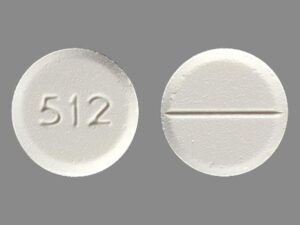Welcome to our comprehensive guide on the complex and potentially dangerous interaction between alcohol and Percocet. While both substances are commonly used for their respective purposes – alcohol for relaxation and socialization, and Percocet for pain relief – combining them can have serious consequences. In this blog, we’ll delve into the risks associated with mixing alcohol and Percocet, explore why this combination can be harmful, and provide insights on how to stay safe.
Contents
What Is Percocet?
 Percocet is a prescription medication commonly used to relieve moderate to severe pain. It’s composed of two main ingredients: oxycodone, an opioid pain reliever, and acetaminophen, a non-opioid pain reliever and fever reducer. Percocet is typically prescribed by healthcare professionals after surgery, injury, or for chronic pain conditions where other pain medications have proven ineffective.
Percocet is a prescription medication commonly used to relieve moderate to severe pain. It’s composed of two main ingredients: oxycodone, an opioid pain reliever, and acetaminophen, a non-opioid pain reliever and fever reducer. Percocet is typically prescribed by healthcare professionals after surgery, injury, or for chronic pain conditions where other pain medications have proven ineffective.
Because Percocet contains an opioid, it carries a risk of addiction, dependence, and overdose if not used as directed by a healthcare provider. Understanding the potential risks and benefits of Percocet and using it responsibly can help ensure its effectiveness in managing pain.
What Happens If You Drink Alcohol After Taking Painkillers?
Combining alcohol with painkillers, especially those containing opioids like Percocet, can have serious consequences. Both alcohol and opioids depress the central nervous system, slowing down breathing and heart rate. When taken together, their effects can compound, leading to increased sedation, drowsiness, and impairment.
Drinking alcohol after taking painkillers can heighten the risk of dangerous side effects. These effects can be particularly dangerous if someone is driving or operating machinery. Additionally, mixing alcohol and painkillers can also increase the likelihood of liver damage due to acetaminophen toxicity, as both alcohol and acetaminophen are metabolized by the liver.
It’s essential to follow the advice of healthcare professionals and prescription labels carefully, avoiding alcohol when taking painkillers. If you have any questions or concerns about combining alcohol with your pain medication, consult your healthcare provider for personalized guidance. Your safety and well-being are paramount.
What Are The Risks Of Alcohol And Percocet?
 Combining alcohol and Percocet can significantly increase the risk of adverse effects and pose several dangers to your health:
Combining alcohol and Percocet can significantly increase the risk of adverse effects and pose several dangers to your health:
Respiratory Depression
Both alcohol and Percocet are central nervous system depressants, meaning they can slow down breathing. When taken together, they can compound this effect, leading to severe respiratory depression, where breathing becomes dangerously slow or shallow. In extreme cases, this can result in respiratory arrest, leading to unconsciousness, coma, or even death.
Central Nervous System Depression
Alcohol and Percocet can both impair cognitive function and motor skills. Combining them can intensify these effects, leading to drowsiness, confusion, impaired coordination, and difficulty concentrating. This increases the risk of accidents, falls, and injuries, particularly when driving or operating heavy machinery.
Increased Risk of Overdose
Mixing alcohol with Percocet can significantly increase the risk of overdose. Both substances can affect the liver, and combining them can lead to liver damage or failure, particularly due to acetaminophen toxicity. Additionally, the sedative effects of alcohol can mask the signs of an overdose. And, making it harder to recognize and respond to the situation promptly.
Gastrointestinal Issues
Alcohol and Percocet can both irritate the stomach lining and increase the risk of gastrointestinal bleeding and ulcers. Combining them can exacerbate these effects, leading to nausea, vomiting, abdominal pain, and gastrointestinal bleeding.
Addiction and Dependence
Both alcohol and opioids like Percocet have addictive properties. Using them together can increase the risk of developing tolerance, dependence, and addiction. This can lead to a dangerous cycle of substance misuse, withdrawal symptoms when trying to stop, and a higher risk of long-term health complications.
Impaired Judgment and Decision Making
Alcohol and Percocet can impair judgment and decision-making abilities, leading to risky behaviors and poor choices. This can have serious consequences for personal and social relationships, employment, and overall well-being.
To mitigate these dangers, it’s crucial to avoid mixing alcohol with Percocet or any other opioid pain medication. If you’re prescribed Percocet, follow your healthcare provider’s instructions carefully, and refrain from consuming alcohol while taking the medication.
How Long Should I Wait to Drink Alcohol After Taking Medicine?
The timeframe for safely consuming alcohol after taking medication can vary depending on the specific medication and its interactions with alcohol. In the case of Percocet or any other opioid pain medication, it’s generally recommended to wait at least 24 hours after taking the medication before consuming alcohol. This allows the medication to be metabolized and eliminated from your system.
However, it’s essential to consult with your healthcare provider or pharmacist for personalized guidance. In general, it’s best to err on the side of caution and avoid alcohol altogether while taking medication, especially if you’re unsure about potential interactions. Also, if the medication carries a risk of side effects when combined with alcohol. Don’t hesitate to seek guidance from a healthcare professional.
How To Manage The Risks Of Alcohol And Percocet?
 Managing the risks associated with alcohol and Percocet involves taking several precautions to ensure your safety and well-being.
Managing the risks associated with alcohol and Percocet involves taking several precautions to ensure your safety and well-being.
Helpful Tips
Below are some tips to help you manage the risks together:
Follow Prescribed Dosage
Take Percocet exactly as prescribed by your healthcare provider. Do not exceed the recommended dosage or take it more frequently than instructed. Taking higher doses increases the risk of adverse effects and interactions, especially when combined with alcohol.
Avoid Alcohol
It’s crucial to refrain from consuming alcohol while taking Percocet or any other opioid pain medication. Alcohol can intensify the sedative effects of Percocet, leading to respiratory depression, impaired judgment, and increased risk of overdose. Even a small amount of alcohol can significantly increase these risks. So it’s best to avoid alcohol altogether.
Inform Healthcare Provider
Be sure to inform your healthcare provider about any alcohol consumption habits or history of substance use. Your healthcare provider can provide personalized guidance and monitor you for any potential interactions or adverse effects.
Monitor Side Effects
Pay attention to any side effects or symptoms you experience while taking Percocet. These may include drowsiness, dizziness, nausea, vomiting, or difficulty breathing. If you experience any concerning symptoms, contact your healthcare provider immediately.
Be Cautious with Other Medications
Avoid combining Percocet with other medications that can potentiate its effects or interact with alcohol. This includes other opioids, benzodiazepines, muscle relaxants, and certain antidepressants. Always consult your healthcare provider or pharmacist before taking any new medications while on Percocet.
Plan Ahead
If you’re prescribed Percocet for pain management, plan to avoid situations where alcohol may be present. This includes social gatherings, celebrations, and events where alcohol consumption is common. Plan alternative strategies for pain management and relaxation that don’t involve alcohol.
Seek Support
If you’re struggling to manage pain or are concerned about the risks of combining alcohol and Percocet, seek support from your healthcare provider, a therapist, or a support group. They can provide guidance, resources, and support to help you navigate these challenges safely.
By following these precautions and seeking support when needed, you can effectively manage the risks associated with alcohol and Percocet, ensuring your safety and well-being while effectively managing pain.
Conclusion
In conclusion, the combination of alcohol and Percocet poses significant risks to your health and safety. Mixing these substances can lead to dangerous side effects, including respiratory depression, impaired judgment, and increased risk of overdose. It’s crucial to follow your healthcare provider’s instructions carefully, avoid alcohol while taking Percocet, and be vigilant for any concerning symptoms.
By taking these precautions and seeking support when needed, you can effectively manage pain while minimizing the risks associated with alcohol and Percocet use. Your safety and well-being are paramount. So prioritize responsible medication use and avoid potentially harmful interactions.
